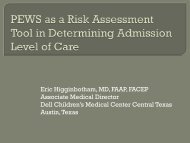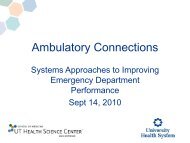- Page 3 and 4:
Appendix ATask Force Members and St
- Page 5 and 6:
Hector Balcazar, Ph.D.Regional Dean
- Page 7 and 8:
Charles Haley, M.D., M.S.Medical Di
- Page 9:
Michael McKinney, M.D.Senior Execut
- Page 12 and 13:
M. Roy Wilson, M.D.PresidentTexas T
- Page 14 and 15:
Appendix BMedicaid and the State Ch
- Page 16 and 17:
services. There are two broad types
- Page 18 and 19:
Mandatory and Optional Covered Popu
- Page 20 and 21:
• Nurse-midwife services;• Fede
- Page 22 and 23:
Disproportionate Share Hospital Pro
- Page 24 and 25:
March 13, 2001, that limited the am
- Page 26 and 27:
year from FFY 2002-2004, $4.05 bill
- Page 28 and 29:
Medicaid beneficiaries. Section 191
- Page 30 and 31:
started in 2001 and 2002 to curb in
- Page 32 and 33:
urban and with fewer than 250,000 p
- Page 34 and 35:
Protection Act of 2000 and the Medi
- Page 36 and 37:
orientation). Recipients of Supplem
- Page 38 and 39:
enrollee is assigned a primary care
- Page 40 and 41:
Table 7. Texas Medicaid Policy Chan
- Page 42 and 43:
Table 8. Texas SCHIP Policy Changes
- Page 44 and 45:
families (through the employer’s
- Page 46 and 47:
share of the match must come from t
- Page 48 and 49:
Reinstating the Medically Needy Spe
- Page 50 and 51:
Endnotes1 Texas Health and Human Se
- Page 52 and 53:
35 Powers, Pyles, Sutter, and Vervi
- Page 54 and 55:
73 Office of Management and Budget,
- Page 56 and 57:
113 TexCare, Children’s Health In
- Page 58 and 59:
150 Lyndon B. Johnson School of Pub
- Page 60 and 61:
States by Groupings with Current El
- Page 62 and 63:
Medicaid and the State Children’s
- Page 64 and 65:
Graduate Medical Education ProgramA
- Page 66 and 67:
needs, however, there is a shortage
- Page 68 and 69:
15 Texas Association of Counties,
- Page 70 and 71:
ecording and evaluation; physical e
- Page 72 and 73:
Medicaid and the State Children’s
- Page 74 and 75:
ReferencesAmerican Academy of Pedia
- Page 76 and 77:
downloads/bipa.pdf#search='Medicare
- Page 78 and 79:
Texas Health and Human Services Com
- Page 80 and 81:
Appendix CAn Analysis of Reform Opt
- Page 82 and 83:
Encouraged by these low rates, Cong
- Page 84 and 85:
Establishing state-only tax incenti
- Page 86 and 87:
New York passed the Health Care Ref
- Page 88 and 89:
Hospital Cost Containment — Maryl
- Page 90 and 91:
dollar spent. 237 Texas spent almos
- Page 92 and 93:
Another option for small businesses
- Page 94 and 95:
• Medical equipment and supplies,
- Page 96 and 97:
pay the premiums for Medicaid benef
- Page 98 and 99:
Medicaid to children born after Sep
- Page 100 and 101:
Bill of Rights or “TABOR”; and
- Page 102 and 103:
The federal share for CHP+ is 65 pe
- Page 104 and 105:
SCHIP: increased eligibility in CHP
- Page 106 and 107:
• Medical equipment and supplies
- Page 108 and 109:
6. Funds obtained through the recov
- Page 110 and 111:
Status ReportMaineCare Program Expa
- Page 112 and 113:
the federal poverty level. 404 Sinc
- Page 114 and 115:
need their jobs as a source of empl
- Page 116 and 117:
Endnotes191 Deborah Chollet, Issue
- Page 118 and 119:
225 Ibid.226 Maryland Health Care C
- Page 120 and 121:
259 Kaiser Family Foundation, State
- Page 122 and 123:
SCHIP&subcategory=Medicaid+Spending
- Page 124 and 125:
325 Kaiser Family Foundation, State
- Page 126 and 127:
361 State Coverage Initiatives, Sta
- Page 128 and 129:
SCHIP&subcategory=SCHIP&topic=Feder
- Page 130 and 131: An Analysis of Reform Options Devel
- Page 132 and 133: ReferencesAdvantage Insurance and F
- Page 134 and 135: Donnell-Kay Foundation. “Amendmen
- Page 136 and 137: Kaiser Family Foundation. Demograph
- Page 138 and 139: State Coverage Initiatives. Profile
- Page 140 and 141: Appendix DLocal Initiatives to Expa
- Page 142 and 143: with more coordinated services that
- Page 144 and 145: FinancingSources of revenue include
- Page 146 and 147: AdministrationThe Health and Hospit
- Page 148 and 149: Until 1993, Denver Health (DH) was
- Page 150 and 151: different benefit plans are offered
- Page 152 and 153: Cost SharingPatient cost-sharing is
- Page 154 and 155: management programs. I-Care promote
- Page 156 and 157: the county indigent care plan. Bene
- Page 158 and 159: Firstplan xxvi,12Moore County, Mich
- Page 160 and 161: Benefits and ServicesEnrollees can
- Page 162 and 163: EligibilityAs of 2005, enrollment i
- Page 164 and 165: etween $23 and $120 per month. Ther
- Page 166 and 167: Healthcare Accountability Act xxxvi
- Page 168 and 169: Coordination - When health care age
- Page 170 and 171: subsidized initiatives offer exposu
- Page 172 and 173: arriers, two health plans attempted
- Page 174 and 175: xxi Simmons, Sandy Coe, Gionfriddo,
- Page 176 and 177: Table 1 (Continued). Local Care Ini
- Page 178 and 179: Table 2 (Continued). Local Coverage
- Page 182 and 183: The human capital approach suggests
- Page 184 and 185: etween standardized test scores (St
- Page 186 and 187: INTRODUCTIONEducation plays a wide
- Page 188 and 189: of children with chronic health con
- Page 190 and 191: Implications. Given the current pre
- Page 192 and 193: DiabetesPrevalence. Diabetes in chi
- Page 194 and 195: Limitations. The cross-sectional de
- Page 196 and 197: chronic lung disease, cystic fibros
- Page 198 and 199: significant differences between tho
- Page 200 and 201: Table 1. Prevalence of Selected Chr
- Page 202 and 203: findings of lower test scores are b
- Page 204 and 205: al (McKewen et al., 1998) report a
- Page 206 and 207: Section 3. School-Based Interventio
- Page 208 and 209: mathematics, science and oral expre
- Page 210 and 211: Table 4. Summary of Research Findin
- Page 212 and 213: etween SES and health is a dose-res
- Page 214 and 215: Self-Rated Health. Evidence accumul
- Page 216 and 217: economic hardship. One of the skill
- Page 218 and 219: Education also improves the stabili
- Page 220 and 221: sex in the expectation of a more pr
- Page 222 and 223: TABLE 6. SUMMARY OF EXPLANATIONS FO
- Page 224 and 225: According to the Census 2000 data,
- Page 226 and 227: Policy Reports Recommendations (Tot
- Page 228 and 229: Section 2. Recommendations on Schoo
- Page 230 and 231:
Childhood ConditionsSchool-based Pr
- Page 232 and 233:
Childhood ConditionsDiabetes (n=11)
- Page 234 and 235:
eduction in reading test scores com
- Page 236 and 237:
Table 10. Estimates of the Cost of
- Page 238 and 239:
National Asthma Education and Preve
- Page 240 and 241:
REFERENCESAck, M., Miller, I., & We
- Page 242 and 243:
Elo, I. T., & Preston, S. H. (1996)
- Page 244 and 245:
Kaemingk, K. L., Pasvogel, A. E., G
- Page 246 and 247:
Miller, D. S., & Miller, T. Q. (199
- Page 248 and 249:
Ross, C. E., & Wu, C. L. (1996). Ed
- Page 250 and 251:
Williams, D. R. (1990). Socioeconom
- Page 252 and 253:
SAMPLE, DESIGN, & INTERVENTIONACHIE
- Page 254 and 255:
SAMPLE, DESIGN, & INTERVENTIONStudy
- Page 256 and 257:
SAMPLE, DESIGN, & INTERVENTIONACHIE
- Page 258 and 259:
SAMPLE, DESIGN, & INTERVENTIONACHIE
- Page 260 and 261:
SAMPLE, DESIGN, & INTERVENTIONACHIE
- Page 262 and 263:
SAMPLE, DESIGN, & INTERVENTIONACHIE
- Page 264 and 265:
SAMPLE, DESIGN, & INTERVENTIONACHIE
- Page 266 and 267:
SAMPLE, DESIGN, & INTERVENTIONACHIE
- Page 268 and 269:
SICKLE CELL ANEMIAArmstrong(1996)SA
- Page 270 and 271:
SAMPLE, DESIGN, & INTERVENTIONACHIE
- Page 272 and 273:
SAMPLE, DESIGN, & INTERVENTIONSickl
- Page 274 and 275:
SAMPLE, DESIGN, & INTERVENTIONhemog
- Page 276 and 277:
SAMPLE, DESIGN, & INTERVENTIONACHIE
- Page 278 and 279:
SAMPLE, DESIGN, & INTERVENTIONStudy
- Page 280 and 281:
Curriculum Content: Statute §28.00
- Page 282 and 283:
• HEALTH PROMOTING ENVIRONMENTSch
- Page 284 and 285:
• COORDINATION/IMPLEMENTATIONCoor
- Page 286 and 287:
Education and Health: A Review and
- Page 288 and 289:
Appendix FState Regulation of Healt
- Page 290 and 291:
coverage they offer. 14 By 2004 onl
- Page 292 and 293:
poor health may make coverage more
- Page 294 and 295:
account for most, or even much, of
- Page 296 and 297:
More active state intervention in t
- Page 298 and 299:
Table 3 (GAO Appendix IV) shows whi
- Page 300 and 301:
Appendix GEmergency and Trauma Care
- Page 302 and 303:
The treatment of shock prior to sur
- Page 304 and 305:
the EMS needs in rural areas of the
- Page 306 and 307:
Level IV trauma centers should be a
- Page 308 and 309:
Table 2. Trends in Trauma Severity,
- Page 310 and 311:
the hospitals were on diversion or
- Page 312 and 313:
Representative Delisi was successfu
- Page 314 and 315:
Mental Health Access ChallengesCare
- Page 316 and 317:
fhttp://www.techproservices.net/his
- Page 318 and 319:
oohttp://www.saveourers.org/reports
- Page 320 and 321:
Appendix HBrief: Consulate ClinicDe
- Page 322 and 323:
In addition, the roundtable discuss
- Page 324 and 325:
clinic(s) affiliated with medical s
- Page 326 and 327:
Appendix ICommon Abbreviations
- Page 328 and 329:
HMOHRQOLHRSAICF/MRIHCTAIOMISSLBBLIU
- Page 330 and 331:
Appendix JPresentersDate/Location:
- Page 332 and 333:
Appendix KProvider Taxes: A Differe
- Page 334:
were previously categorized as char







